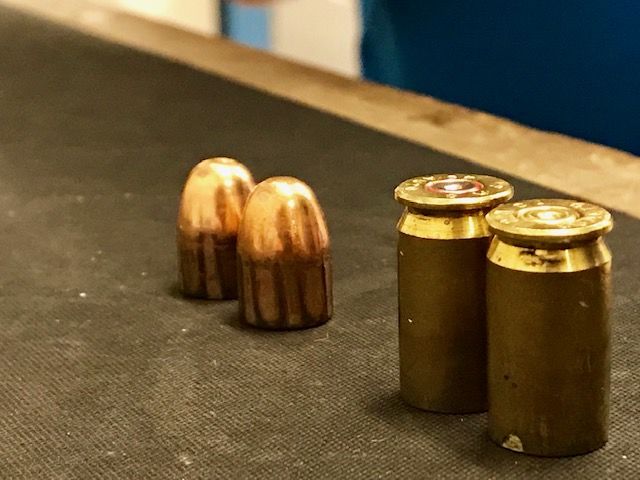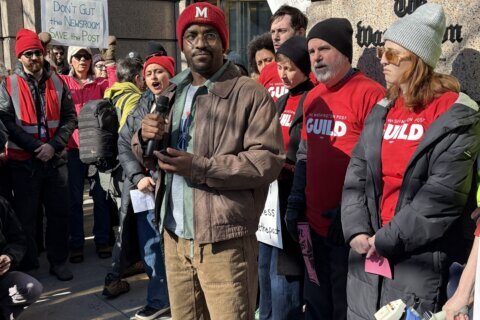
Defending itself against allegations of “fraudulent behavior” that led to the loss of its accreditation, D.C.’s embattled crime lab says it never deliberately concealed any information from its accrediting board.
An 18-page appeal, filed last month by the D.C. Department of Forensic Sciences with the ANSI National Accreditation Board (ANAB) and obtained by WTOP, acknowledges the lab didn’t turn over a PowerPoint presentation that showed lab examiners reviewing disputed evidence in a murder case initially agreed with an outside audit team that cartridge casings from two 2015 killings were not linked to the same gun.
But the appeal, signed by then-DFS Director Jenifer Smith, suggests that presentation presented only a “working conclusion,” and was not an official firearms examination. The lab also claims it relied in “good faith” on the word of its former firearms supervisor when, just a few days after the PowerPoint presentation in April 2020, the lab relayed a completely different finding to its accrediting board.
“Nowhere in the materials available to DFS is any evidence of deliberate concealment, fraud, or misrepresentation apparent,” the appeal stated.
The revelations and the subsequent fallout over how the independent forensic lab handled the error, which was first flagged by prosecutors, has embroiled DFS over the past few months. Smith, who led the agency since 2015, stepped down late last month, nearly two months after the accrediting board suspended and then withdrew the lab’s forensic accreditation, halting the lab’s analysis of evidence from crime scenes.
The ANAB accrediting board pointed to “credible evidence,” contained in a report issued by the prosecutors’ audit team, that the lab had “engaged in misrepresentations and fraudulent behavior, and engaged in conduct that brings ANAB into disrepute.”
Separately, the lab is also being investigated by the D.C. Office of the Inspector General, which is conducting a criminal probe.
Stakeholders respond
The lab’s stakeholders, including prosecutors and defense attorneys, do not appear to be swayed by the arguments laid out in the lab’s appeal.
A spokeswoman for D.C. Attorney General Karl Racine said in an email to WTOP Friday: “DFS had its accreditation suspended after the lab’s senior leadership misled its accrediting body and DFS failed to disclose important information in a homicide case. DFS’ handling of this situation has undermined public safety and confidence in the criminal justice system. We look forward to working with the lab’s new leadership to reform DFS and its procedures, and rebuild trust in its scientific analysis of evidence in criminal and juvenile cases.”
Racine’s office prosecutes misdemeanors and juvenile crimes in the District.
The D.C. Public Defender Service, which represents people accused of crimes in the District who cannot afford lawyers, said the lab’s appeal does not go far enough in explaining why conclusions went undisclosed or why the lab conducted casework that was never properly documented.
“The appeal document does not adequately address the off-the-books examinations and cherry-picked results that DFS chose to release while it was examining this ballistics evidence,” Jessica Willis, PDS special counsel for forensics, told WTOP in an email. “PDS remains deeply concerned that the failed quality control systems in place at DFS may have led to wrongful prosecutions and wrongful convictions of our clients.”
An email to the U.S. Attorney’s Office for D.C. seeking comment on the lab’s appeal has not been returned. WTOP has learned federal prosecutors intend to publicly file the lab’s appeal in D.C. Superior Court as early as Friday, as well as their own response to it.
In its appeal, DFS also lodged complaints about the three-person team of experts assembled by the U.S. Attorney’s Office for D.C. and the attorney general’s office to audit the lab’s firearms unit, alleging “documented, undisclosed and fatal” conflicts of interest.
The appeal criticizes the lead auditor in personal terms, suggesting he was a biased observer because he was a “disappointed applicant” for the role of DFS director when the city was seeking a new director several years ago and ultimately hired Smith.
Dr. Bruce Budowle, a widely published DNA scientist at the University of North Texas, told WTOP in a phone interview the lab’s criticism of him and other auditors was an attempt to deflect from the serious quality issues detailed in the audit team’s public reports.
“When people don’t want to get into the root cause of the problem, they go to the personal attack,” he said.
DFS also argued in the appeal that the accrediting board shouldn’t have relied on the audit team’s findings and stripped the lab of its accreditation without doing its own investigation.
However, in an email from the accrediting board official to Smith and other DFS officials in early April, shortly after suspending the lab’s accreditation and well before the appeal, an ANAB official informed DFS that the board had an opportunity to review the report’s source materials to verify its claims before moving to suspend the lab’s accreditation.
WTOP obtained the email through a Freedom of Information Act request.
The accrediting board’s decision to strip a lab’s accreditation is exceedingly rare, and the next steps are fairly opaque. The board is expected to hold a nonpublic hearing on the matter later this summer, at which DFS can further present its appeal. The board will then decide whether to stick with its decision to revoke the lab’s accreditation or reverse the move, but the deliberations will not be public.
Probe followed error
The appeal is the latest step in an acrimonious battle between the D.C. lab and the U.S. Attorney’s Office for D.C. and attorney general’s office that has lasted a year and half.
Prosecutors, preparing to take a murder case to trial in January 2020, discovered an error in a DFS analysis that mistakenly linked cartridge casings found at the scene of two 2015 killings to the same gun.
As a result, federal prosecutors, along with the attorney general’s office, launched the outside audit of the lab’s Firearms Examination Unit in the spring of 2020.
The lab declined to cooperate with the review, saying, in part, the review would “undermine our independence.”
A final report by the audit team filed March 18 alleged that when DFS examiners finally reviewed the disputed casings after learning of the original error, they agreed the casings were not fired by the same gun, but the lab essentially buried that finding, the report alleged, along with other contradictory findings, and decided to report a finding of “inconclusive.”
In its 20-page report, the audit team said it had uncovered “very serious, and perhaps more troubling, problems associated with DFS management,” including that managers sought to pressure examiners to change their conclusions. The report said the issues uncovered “cast doubt on the reliability of the work product of the entire DFS laboratory.”
DC resisted turning over appeal
Ever since the allegations of fraud and concealment came to light in late March, the lab has resisted publicly responding to the report’s specific allegations.
In late April, Smith, the lab’s former director, acting under orders from the mayor, skipped a D.C. Council oversight committee hearing chaired by Ward 6 Council member Charles Allen and later held a closed-door meeting of the lab’s Science Advisory Board to discuss the matter at which stakeholders, including the D.C. Public Defender Service, were expressly denied access.
Since late April, WTOP had sought a copy of the ANAB appeal from both the lab and the office of the D.C. Deputy Mayor for Public Safety and Justice. A spokeswoman for the deputy mayor’s office told WTOP the appeal could only be provided through a Freedom of Information Act request, which WTOP filed April 30.
DFS this week turned over documents sought by WTOP under the FOIA request, but as for the appeal, provided only a screenshot of the webpage on which the appeal was filed — not an actual copy of the document.
However, the lab’s appeal is now being disclosed in some cases in D.C. Superior Court, and WTOP obtained a copy.
On Thursday, a copy of the appeal also began circulating on Twitter, but it was missing the cover letter signed by Smith, the agency’s former director.
Lab says: No concealment
The appeal to ANAB for the first time seeks to explain why the April 30, 2020, PowerPoint presentation prepared by a firearms supervisor for the lab’s senior leaders was never disclosed outside the agency until the lab was subpoenaed by federal prosecutors. The appeal also lays out an explanation for why the lab’s accrediting board was provided a different finding than what the PowerPoint presentation indicated.
In the PowerPoint presentation, the firearms supervisor and another examiner, who both examined the disputed casings under a microscope, presented a finding of elimination — meaning they concluded the casings from the two different crime scenes were not fired in the same gun.
In the oversight hearing before Allen’s committee in late April, Attorney General Karl Racine said the fact that the elimination finding was never disclosed outside DFS is troubling, because such a finding amounts to exculpatory evidence — evidence that is favorable to a person charged with a crime because it could exonerate them — which prosecutors have a duty to disclose to defense attorneys.
But the lab, in its appeal, argued the PowerPoint review was not a full re-examination of the evidence, and that examiners were looking only at some markings on the casings when they prepared the presentation.
The PowerPoint presentation “was not a firearms examination report reaching a conclusion of Exclusion/Elimination, it was an update on the technical portion of an internal error investigation,” the appeal stated.
The appeal also claimed the firearms supervisor who prepared the PowerPoint review was the person who told lab management a week later to report an inconclusive finding to the accrediting board, and the lab said it believed that was “the most accurate, genuine, and up-to-date characterization” of the evidence review.
That description of events appears to conflict with the findings of the audit report.
In that report, the firearms supervisor, who has since left the agency, told investigators with the inspector general’s office that he reported the elimination finding from the PowerPoint presentation in a meeting with lab managers, which included the head of the firearms unit, the head of the forensic science lab division within DFS and the agency’s general counsel.
That meeting caused “lots of chaos,” he told investigators, and it was collectively decided to report an inconclusive finding, in part, because at least one of the officials expressed concerns that reporting the elimination finding showed DFS had made a mistake and because the lab had come to so many contradictory conclusions.
The supervisor told investigators that after he conducted his review, additional examiners looked at the casings, a practice the supervisor called “answer shopping” that was apparently common at DFS. In that process, some examiners continued to erroneously conclude the casings were fired in the same gun. Most of those examinations were also not disclosed outside the agency, according to the audit report and the supervisor’s interviews with investigators.
In the end, the firearms supervisor told investigators he felt manipulated by management into conducting a documented re-examination of the evidence, which ultimately also reached an inconclusive finding — after the ANAB email had been sent earlier that month.
In its appeal, the lab acknowledges that DFS did not disclose the April 30 PowerPoint presentation that contained the elimination finding to the accrediting board, but said it wasn’t an act of concealment. Rather, the appeal suggested the lab didn’t think the accrediting board would be interested.
“While it is true that DFS did not provide a copy of the April 30, 2020 PowerPoint in its May 6, 2020 ANAB disclosure, the record available to DFS does not provide any evidence that this omission was an act of concealment — deliberate or otherwise.”
The appeal went on to say: “The April 30, 2020 PowerPoint presentation was prepared as part of the FEU’s internal investigation” of the original casework error. “If DFS had been given notice that ANAB had a special interest in the materials generated as part of its internal investigation into the cause of the … error, DFS’s long and successful history with ANAB suggests DFS would have provided this and other related materials for ANAB’s review.”
The appeal also claims that part of the reason the accrediting board was provided a different conclusion was because, after the PowerPoint meeting, another firearms examiner took additional microscopic photos of the disputed casings — which apparently shifted the finding toward inconclusive. However, according to data in the audit report — based on the agency’s own evidence logs — that examiner did not appear to be in possession of the casings on the date the agency now says she took microscopic photos of them.
Criticizes conflicts of interest
Among other arguments made in the appeal, the lab criticizes the audit team for what it characterized as serious undisclosed conflicts of interest.
“ANAB is an impartial body and should not adopt as its own the findings of the audit team that did not disclose conflicts of interest,” the lab’s appeal stated.
Budowle, the Texas DNA scientist and quality assurance expert who led the audit team, was a “disappointed applicant” for the DFS director position, the lab said in its appeal. The lab also said the scientist is a close personal friend of Assistant U.S. Attorney Michael Ambrosino, who handles the prosecutor’s office’s forensic casework and convened the audit team.
Budowle told WTOP he has worked with Ambrosino for 20 years and it was natural that colleagues who worked together for so long would consider themselves friends. He noted that he previously led a review of the DFS DNA unit, which the city supported, and though not a firearms expert himself, he has experience running labs and has reviewed other labs through his work with the Texas Forensic Science Commission.
Budowle said he did, in fact, apply for the DFS director position in 2015, but that he would have had to take a $100,000 pay cut if he had been selected and he applied for the position more as a platform to advocate reforms to the lab’s DNA unit, which was in turmoil at the time.
Of the personal criticisms directed at him, Budowle said, “They tried to make this a personality issue to distract from the fundamental issues.”
Accrediting board: Verified findings
The lab’s appeal and other documents obtained by WTOP also show the agency repeatedly asked ANAB to identify specific instances of fraud or concealment beyond the findings of the audit report, saying it would be “fundamentally improper” for the accrediting board to base its decision on the audit report, alone.
In an email obtained by WTOP through the FOIA request, when the lab was informed by ANAB on April 2 that its accreditation was being suspended, Smith, then the director, wrote to an official at the board: “To afford DFS a meaningful opportunity to respond to these allegations, we need to be able to review specific allegations of instances of deliberate concealment, misrepresentation, or fraudulent behavior,” Smith wrote, also requesting a “complete copy of the audit team’s source documents.”
In an April 5 letter to Smith, Pamela Sale, an ANAB official, responded: “While ANAB has been given an opportunity to review the source material underlying the Final Audit Report in order to verify the audit findings as they relate to ANAB’s accreditation of DFS, ANAB is not at liberty to provide the source material to you in light of the ongoing criminal investigation of DFS.”
Sale’s letter said the detailed summaries contained in the audit report “amply outline information that DFS misrepresented to and concealed from the ANAB assessment team.”
The letter added: “Because DFS is in possession of all of its own records and has access to its personnel, it is in possession of all the information it might rely on to refute the auditors’ findings.”








